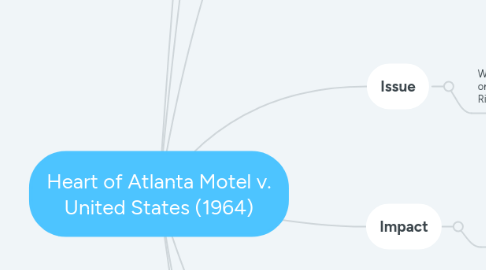
1. Facts
1.1. Parties
1.1.1. Heart of Atlanta Motel
1.1.2. The United States of America
1.2. What Happened
1.2.1. The owner of the Heart of Atlanta Motel violated the Civil Rights Act of 1964 when he refused to rent rooms to African Americans.
1.2.1.1. The motel owner brought an action before the U.S. District Court to have the Civil Rights Act declared unconstitutional. He claimed that Congress had exceeded its constitutional authority to regulate commerce by enacting the statute. His claim was that his business was "purely local" and was not engaged in interstate commerce.
1.2.2. The U.S. District Court ruled that the application of the statue did not violate the Constitution.
1.2.2.1. The U.S. District Court court ruled that discrimination by hotels and motels impedes interstate travel, and therefore is shall not be considered "purely local" operations.
1.3. Procedural History
1.3.1. The U.S. District Court ruled against the Heart of Atlanta Motel.
1.3.2. The owner of the Heart of Atlanta Hotel appealed the decision of the U.S. District Court.
1.3.2.1. The case was brought before the Supreme Court of the United States.
2. Issue
2.1. Whether Congress exceeded its authority, or not, in its application of the statue (Civil Rights Act of 1964).
3. Rule of Law
3.1. Legal Principles
3.1.1. Commerce Clause
3.1.1.1. Authorizes Congress to regulate interstate commerce.
3.2. Legal Precidents
3.2.1. Wickard v. Filburn
3.2.1.1. In 1942, the Supreme Court held that wheat production by an individual farmer intended wholly for consumption on his own farm was subject to federal regulation.
4. Impact
4.1. Several cases have cited Heart of Atlanta Motel v United States, including:
4.1.1. United States v. Alfonso D. Lopez, Jr.
4.1.1.1. The United States cited the case a precedent for Congress governing to protect certain groups (in this case students from guns).
4.1.2. Playboy Entertainment Group, Inc. v. United States (1996)
4.1.2.1. The United States cited the case as precedent for Congress governing interstate commerce (in this case telecommunications) to protect certain groups of people (in this case children).
5. Conclusion
5.1. The United States Supreme Court upheld the decision of the U.S. District Court.
6. Analysis/Application
6.1. How did each side present the Rule?
6.1.1. Heart of Atlanta Motel
6.1.1.1. The motel was not engaged in interstate commerce but was “of a purely local character.”
6.1.1.2. Congress had exceeded its constitutional authority by applying the statue to the motel business.
6.1.2. United States of America
6.1.2.1. The motel was accessible to state and interstate highways.
6.1.2.2. The motel advertised nationally and maintained billboards throughout the state.
6.1.2.3. The motel accepted convention trade from outside the state.
6.1.2.4. 75% of the motel's guests were residents of other states.
6.2. What was the court’s reasoning in its analysis?
6.2.1. The court decided that there was enough evidence to prove that the motel business engaging in interstate commerce.
6.3. How did the court apply the facts in the case to the legal requirements?
6.3.1. The court tested the claim of both parties, and concluded that there were a number of facts showing that the motel was an interstate business.
6.4. Did the court expand, reinterpret, or narrow the law to reach its conclusion?
6.4.1. No; the United States Supreme Court reaffirmed the decision of the U.S. District Court.
7. Importance
7.1. Why would a health care professional would care about this decision?
7.1.1. 1. Health care professionals must ensure that ALL patients receive the same standard of care.
7.1.2. 2. Health care professionals must not consider a person (job candidate, vendor,etc.) based on race, color, national origin, religion or gender.
7.1.3. 3. Health care professionals must realize that they are in a public practice, which can be regulated by Congress.
